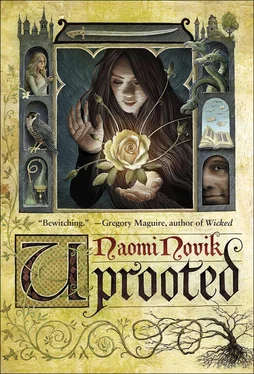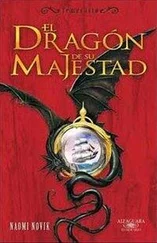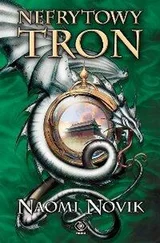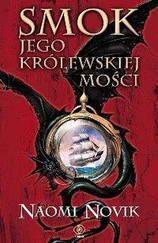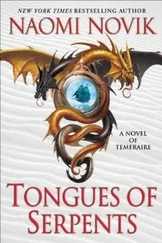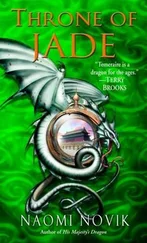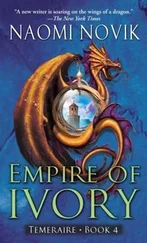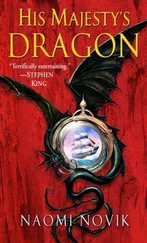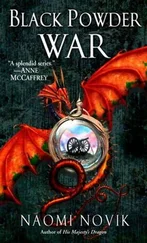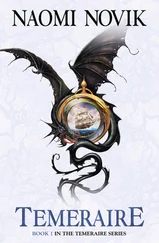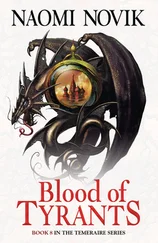I had to tell them that there wasn’t anything to bring him out of, anymore; that the tree was him. I was too tired to explain very well, but anyway it wasn’t something people could easily understand, even people from the valley. The sons stood in baffled silence, confused whether to grieve or not. “He missed Mother,” the eldest said finally, and they all nodded.
None of the villagers felt easy about having a heart-tree growing on their bridge, but they trusted me enough at least that they’d left it standing. It had grown well since then: its roots were already twining themselves enthusiastically with the logs of the bridge, promising to take it over. It was laden with fruit and birds and squirrels. Not many people were ready to eat a heart-tree’s fruit yet, but the animals trusted their noses. I trusted mine, too: I picked a dozen more for my basket and went on, singing my way down the dusty long road to Dvernik.
Little Anton was out with his family’s flock, lazing on his back in the grass. He jumped up when I lurched into his field, a little nervously, but mostly everyone had gotten used to my appearing now and then. I might have been shy of going home at first, after everything that had happened, but I’d been so tired after that terrible day, tired and lonely and angry and sad all at once, the Wood-queen’s sorrow and my own all tangled up. After I finally finished clearing out Zatochek, almost without thinking my weary feet turned and took me home. My mother took one look at me in the doorway and didn’t say anything, just put me to bed. She sat beside me and stroked my hair, singing until I fell asleep.
Everyone was jumpy around me the next day when I came out to the village green to talk to Danka and tell her a little of what had happened, and to look in on Wensa, and on Jerzy and Krystyna. But I was still tired and in no mood to be considerate, so I just ignored the twitching, and after a while of my not setting anything on fire or turning into a beast, it stopped. I learned from the lesson to make people get used to me; now I made a point of stopping into all the villages regularly, a different one each Saturday.
Sarkan hadn’t come back. I didn’t know if he’d ever come back. I heard fourth- or fifth-hand that he was still in the capital, setting things right, but he hadn’t written. Well, we’d never needed a lord to settle quarrels for us, the headmen and — women could do that, and the Wood wasn’t the same kind of danger as before, but there were some things a village needed a wizard for, if they could get one. So I went around to all of them, and put a spell on the beacon-fires, and now if they lit them, a matching candle in my cottage lit up to tell me where I was wanted.
But today I wasn’t here to work. I waved to Anton and tramped on into the village. The heaped harvest tables were out on the green, dressed in white cloth, with the square in the middle for dancing. My mother was there with Wensa’s two oldest daughters, putting out trays full of stewed mushrooms; I ran and kissed her, and she put her hands on my cheeks and smoothed my tangled hair back, smiling with her whole face. “Look at you,” she said, picking a long silver twig out of my hair, and some dried brown leaves. “And you might as well be wearing boots. I should tell you to go wash up and sit quietly in the corner.” My bare legs were thick with dust to my knees. But she was laughing, joyful, and my father was driving the wagon-cart in with a load for the evening bonfire.
“I’ll clean up before it’s time to eat,” I said, stealing a mushroom, and went to go sit with Wensa in the front room of her house. She was better, but still spent most of her time sitting in a chair by the window, only sewing a little. Kasia had written to her, too, but a stiff, stilted letter: I had read it to her, and softened it a little where I could. Wensa listened to it in silence. I think there was a secret guilt in her to match Kasia’s secret resentment: a mother who had resigned herself to an unnecessary fate. That would be a long time healing, too, if it ever did. She did let me persuade her to come to the green with me, and I saw her settled at the tables with her daughters.
There wasn’t a pavilion this year: it was only our own small village festival. The big festival was in Olshanka, as it was in every year without a choosing: as it would be every year from now on. We were all too hot eating in the sun, an odd sensation for harvest-time, until it finally sank low. I didn’t care. I ate a big bowl of sour zhurek with slices of boiled eggs floating, and a plateful of stewed cabbage and sausage, and then four blini full of sour cherries. Then we all sat around in the sun groaning how good the food had been and how we’d all eaten too much, while the small children ran around wildly in the green until little by little they lay down under the trees and fell asleep. Ludek brought out his suka and put it across his knees and began playing, quietly at first; as more of the children drowsed off, more instruments came out and began joining in, people clapping and singing as the mood took them, and we opened the beer-casks and passed around the cold jug of vodka brought up from Danka’s cellar.
I danced with Kasia’s brothers and mine, and after that with a handful of other boys I knew a little. I think they were off to one side daring one another to ask me, but I didn’t care. They were a little nervous that I might lob fire at their heads, but in the same way I had been nervous to go creeping across old Hanka’s yard at twilight to steal the big sweet red apples from her tree, the best ones for eating. We were all happy, all together, and I could recognize the song of the river running through the ground beneath our feet, the song we really danced to.
I sat down in a breathless heap in front of my mother’s chair, my hair tumbled loose around my shoulders again, and she gave a sigh and put it in her lap to braid it back up. My basket was at her feet, and I took another of the tree-fruits to eat, golden and bursting with juice. I was licking my fingers and half lost in the bonfire when Danka stood up abruptly from the long bench corner to ours. She put down her cup and said loudly enough to make everyone pay attention, “My lord.”
Sarkan was standing at the opening of the circle. One hand perched on the table nearest him, firelight leaping to pick out his silver rings and fine silver buttons and the winding silver embroidery along the edges of his blue coat: a dragon whose head began at his collar and ran all along the borders of the coat until the tail came back up to the collar on the other side. The lace cuffs of his shirt spilled past the sleeves, and his boots were so brightly polished the fire shone in them. He looked grander than the king’s ballroom, and perfectly improbable.
All of us were staring at him, me included. His mouth thinned with what I would have called displeasure, once, and now named prickly mortification. I climbed to my feet and went to him, licking my thumb clean. He darted a look at the uncovered basket behind me, saw what I was eating, and glared at me. “That’s appalling,” he said.
“They’re wonderful!” I said. “They’re all coming ripe.”
“All the better to turn you into a tree, ” he said.
“I don’t want to be a tree yet,” I said. Happiness was bubbling up through me, a bright stream laughing. He’d come back. “When did you arrive?”
“This afternoon,” he said stiffly. “I came to receive the taxes, of course.”
“Of course,” I said. I was sure he’d even gone to Olshanka for the tribute first, just so he could pretend that was the truth for a little bit longer. But I couldn’t really bring myself to pretend with him, not even long enough for him to get used to the idea; my mouth was already turning up at the corners without my willing it to. He flushed and looked away; but that wasn’t any better for him, since everyone else was watching us with enormous interest, too drunk on beer and dancing to be polite. He looked back at me instead, and scowled at my smile.
Читать дальше
